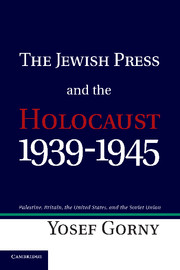 The Jewish Press and the Holocaust, 1939–1945
The Jewish Press and the Holocaust, 1939–1945 Book contents
- Frontmatter
- Contents
- Preface
- Introduction
- Part I From Concern to Outcry – 1939–1942
- Part II The Illusion Dashed – 1942–1945
- 3 The Hebrew-Language Press in Palestine
- 4 The American Jewish Press, 1942–1945
- 5 The British Jewish Press, 1939–1945
- 6 The Brief Days of Jewish National Unity
- Part III The Individual Confronts the Horror
- Conclusion
- Bibliography
- Index
- References
6 - The Brief Days of Jewish National Unity
Aynikayt, 1942–1945
from Part II - The Illusion Dashed – 1942–1945
Published online by Cambridge University Press: 05 November 2011
- Frontmatter
- Contents
- Preface
- Introduction
- Part I From Concern to Outcry – 1939–1942
- Part II The Illusion Dashed – 1942–1945
- 3 The Hebrew-Language Press in Palestine
- 4 The American Jewish Press, 1942–1945
- 5 The British Jewish Press, 1939–1945
- 6 The Brief Days of Jewish National Unity
- Part III The Individual Confronts the Horror
- Conclusion
- Bibliography
- Index
- References
Summary
Aynikayt (“Unity”) was the organ of the Jewish Anti-Fascist Committee, which was formed in the Soviet Union in 1942 and dismantled in 1948. Born in tragedy and dying in tragedy, the newspaper began as an initiative of the naïve and carried on as an effort of the true believers. Both met their demise at the hands of the murderers whom they had sought to serve. The story began with an initiative by two leading figures in the Polish Bund, Henryk Erlich and Wiktor Alter, who had fled to the Soviet-ruled zone in Poland after the Wehrmacht occupied Warsaw, and it ended almost a decade later, in 1948, with the trial of the leaders of the Anti-Fascist Committee and their subsequent execution by the Stalinist regime.
The affair was researched with thoroughgoing exactitude by Shimon Redlich, who based himself on findings from Russian archives that were declassified for historians in the past fifteen years. The introduction to this chapter, then, is based on Redlich’s research.
It began with an ideological and political paradox. Erlich and Alter were longtime persistent opponents of Stalinist Communism. Consequently, when they escaped to the Soviet-occupied zone in eastern Poland, the authorities summarily arrested them and, in the summer of 1941, sentenced them to death. Pursuant to the Nazi German invasion, however, they were released from prison at the initiative of the chief of the NKVD, Lavrentiy Beria, to establish an international Jewish anti-Fascist committee that would aid the Soviet Union in its war by propagandizing in the United States and Britain with the help of Jewish public opinion. Notably, this initiative came about nearly half a year before the United States entered the war against the German-Japanese Axis. Therefore, the Soviet government’s principal target was American public opinion and especially its Jewish segment, which, to Moscow’s mind, was able to influence the U.S. government. Erlich and Alter were known for their connections with leading American Jewish unionists and intellectuals, so Beria sought to turn them into instruments in the service of his goal. Their committee would thus join other panels that had been established in the USSR on an ethnic or professional basis for the same purpose.
- Type
- Chapter
- Information
- The Jewish Press and the Holocaust, 1939–1945Palestine, Britain, the United States, and the Soviet Union, pp. 185 - 202Publisher: Cambridge University PressPrint publication year: 2011


